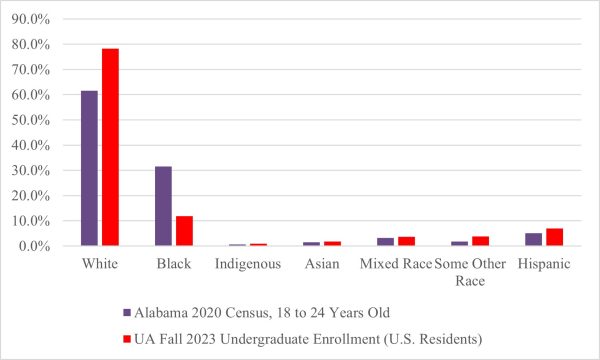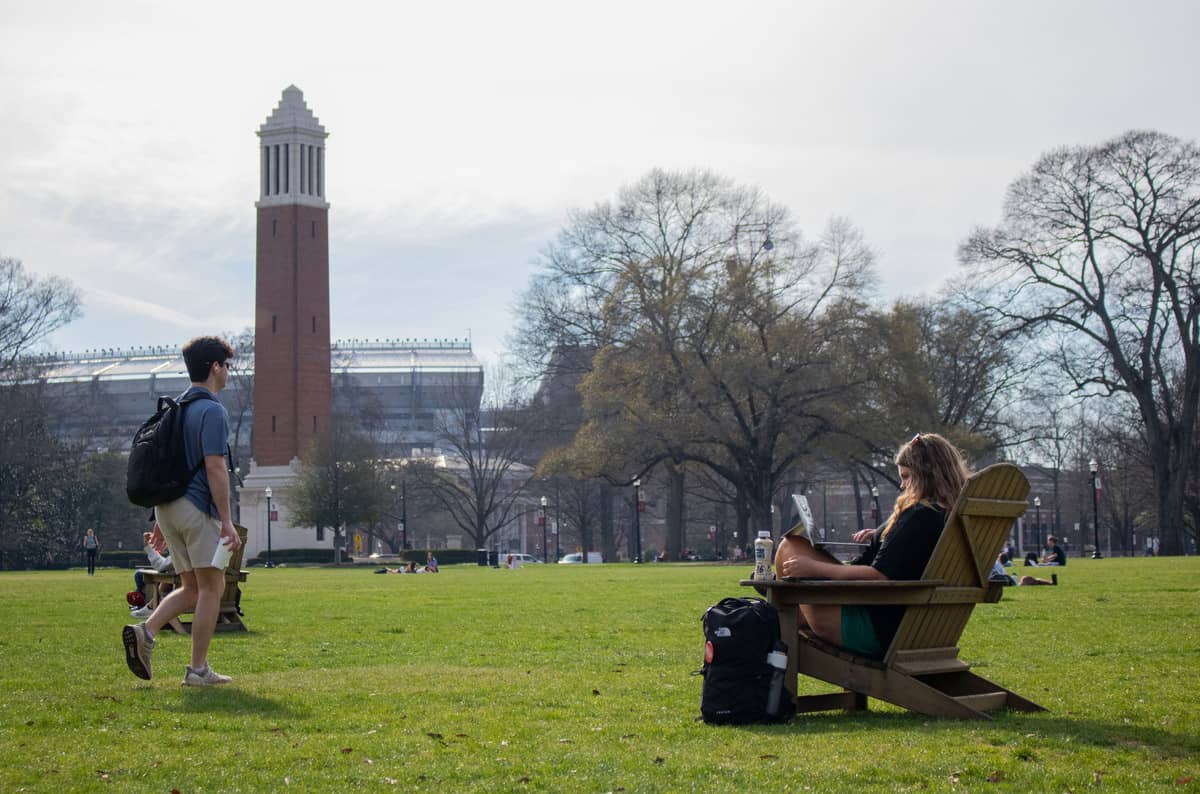Editor’s note: An earlier version of this article misstated the context of George Wallace’s Stand in the Schoolhouse Door. Wallace blocked the entrance to Foster Auditorium in 1963, not 1956, to prevent the registration of Vivian Malone and James Hood, not Autherine Lucy Foster.
In October 2023, The University of Alabama announced it would be discontinuing its National Recognition Scholarship program, which provided the only scholarships specifically for Hispanic and Indigenous students.
This is just the latest in a recent trend of universities across the nation doing the same, including Texas A&M and the University of Central Florida.
For 38 years, the College Board’s National Recognition Programs have given awards to “high-performing, underrepresented students” who identified as Black, Hispanic or Indigenous, or attended high school in a rural area or small town.
In order to qualify, students need to score in the top 10% on the PSAT/NMSQT or PSAT 10, or pass two or more AP exams during their sophomore and junior years.
In 2019, the University’s Path Forward Diversity Report established a goal of creating a new scholarship program to improve socioeconomic diversity and help underserved communities in Alabama within one to three years.
In 2021, according to UA associate director of communications Alex House, the University began offering National Recognition Scholarships.
And until this past October, UA students who had received the College Board’s National Recognition awards received four years of tuition, one year of on-campus housing, and a $1,000-per-year stipend for their academic achievement, similar to the Presidential Elite scholarship.
Now, just a couple years after it was established, and only five years after the promise was first made, the University has already gotten rid of it.
This decision will only harm historically underrepresented scholars across the nation now denied the opportunity to attend The University of Alabama.
When asked if she came to the University because of the National Recognition Scholarship, Faith Rollo said, “Absolutely yes.” Amelia Diaz said, “Yes, it is actually the sole reason why I came here.”
“I love it here and if it were not for that scholarship, I would be at a private research college paying $70k a year,” Alex Aguillon said in an email.
In past decades, tuition prices have risen significantly across the country. Adjusted for inflation, out-of-state tuition has risen 38% in the last 20 years, while in-state tuition has risen 56%.
The National Recognition Scholarship served to attract the brightest scholars from underrepresented communities to Tuscaloosa by actually making the Capstone an affordable option.
Aguillon, who received the scholarship under the National African American Recognition Program, said that the scholarship program “was getting the best and brightest of overlooked communities.”
Without this financial aid, it’s certain that many bright young students from disadvantaged backgrounds will find themselves unable to attend the Capstone, especially given the disparities in wealth and income by ethnicity and race.
Diaz said, “So, I definitely feel like as a whole, representation of people’s ideals, culture, religion, race, is just going to decrease overall.”
And it’s not like The University of Alabama was doing that great of a job at representation in the first place. UA fraternities and sororities had to be told to integrate only 11 years ago.
The University’s boasts about having the “highest number of under-represented minority students enrolled at any university in the State of Alabama” are simply lies by omission. While it may have the highest number of under-represented minority students, that’s only because it’s easily the largest university in Alabama, with over 7,000 more undergraduate students than the second largest, Auburn.
If you actually compare the demographics of UA undergraduates with the demographics of 18- to 24-year-olds in Alabama, The University of Alabama is far, far whiter than the state it takes its name from.
At the University, 78.2% of undergraduates are white, compared with 61.6% of college-age adults in Alabama. Only 11.8% of UA undergraduates are Black, compared with 31.5% of college-age adults in Alabama

Ending the National Recognition Scholarship so quickly will just further entrench this unjust racial disparity at a school nominally supposed to foster a “culture of inclusivity.”
In addition to the aggregate effects, ending the National Recognition Scholarships will have major consequences for families who’d envisioned sending all of their children to the same school.
Talking about her little brother, Diaz said, “He is a junior in high school, and we were all planning on him to get the same award as me and then come here on the same scholarship.”
Rollo’s little brother “was thinking about coming here on the same scholarship, but now he definitely won’t be able to.”
Of course, while underrepresented families are being stripped of their opportunity to send their children to the same school, the University is more than happy to help give legacy students a leg up.
The UA admissions office considers applicants’ alumni relations when deciding whom to admit, and the UA Alumni Association offers a bevy of scholarships to the children and grandchildren of alumni.
Diaz notes that these scholarships are “just going to reaffirm the majority of past students. So basically, as we know in the past, like in the 1900s, those graduating classes were all of one race or one culture.”
“And now, since they’re going to have more preference with their alumni scholarship, we’re just going to continue having that. We’re not going to push for diversity.”
Many, however, still argue that universities should not be pushing for diversity at all, despite their stated commitments.
Commenting on The Crimson White’s Instagram post about the University ending National Recognition Scholarships, UA College Republicans president Riley McArdle said, “Great news!! Excited to continue the fight for equal opportunity for college students in Alabama!”
His sentiment is, unfortunately, not a rare one. The Wisconsin Assembly just passed a bill that would ban considering diversity when making decisions on financial aid.
The University of Iowa is casting a critical eye on its scholarships aimed at people from diverse backgrounds, and the University of Missouri has already begun to phase out race as a consideration in scholarship decisions.
In Florida, Gov. Ron DeSantis banned public universities and colleges from using public funds for any diversity programs.
But none of this ire is being aimed at legacy admissions. It seems like, to many, programs that take into account people’s backgrounds are only OK if the beneficiaries are likely from affluent and advantaged families.
In past decades, The University of Alabama has thankfully been becoming a more welcoming and open place for people from all backgrounds. But this progress has never been uncontested.
Famously, when Autherine Lucy Foster first enrolled in 1956, she was met by violent protest. The bricks of Smith Hall still bear the marks of damage likely received during a riot as she sought to attend class. In 1963, then-Gov. George Wallace blocked the door to Foster Auditorium with his own body to prevent two Black students, Vivian Malone and James Hood, from registering for classes.
While our SGA recently unanimously passed a resolution commending the UA Division of Diversity, Equity and Inclusion, the state legislature now seems poised to ban DEI initiatives and “divisive concepts” at public schools and universities.
In 2021, the University began awarding National Recognition Scholarships to skilled students from underrepresented backgrounds. Two years later, it reversed its course.
The University’s recent decision is a major step backward and an abject betrayal of the goals it set for itself in the 2019 Path Forward Diversity Report.
“I do feel like The University of Alabama should have done a better job in standing firm with its initiatives to improve diversity since 2019,” Diaz said. “And honestly, I am a little ashamed of the University.”
Hopefully the University is ashamed of itself, and seriously reconsiders its decision to remove the National Recognition Scholarship.
Daniel Tharp is a freshman majoring in economics and international studies. He is a National Rural and Small Town Recognition awardee and is attending The University of Alabama on the National Recognition Scholarship.







